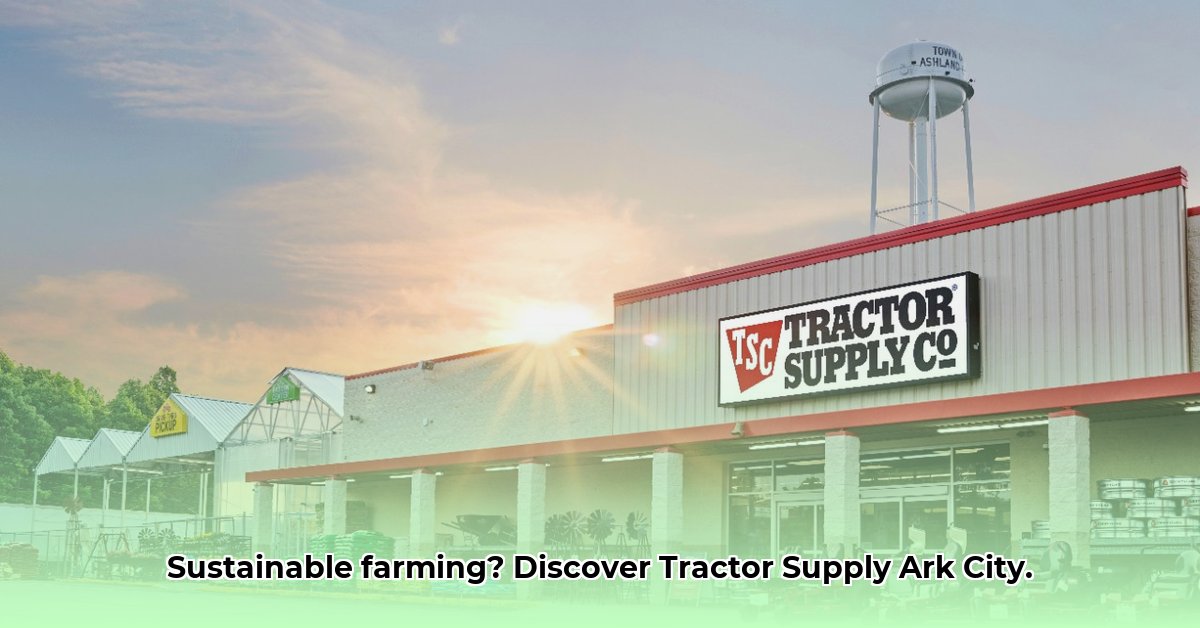
Tractor Supply (TSC) in Ark City is more than just a retail store; it's a crucial component of the local agricultural ecosystem, quietly playing a significant role in supporting sustainable farming practices. For many Ark City residents, TSC is the primary source for everything from seeds and fertilizers to tractor parts and animal feed. This readily available access to essential supplies is transformative for both small-scale farmers and home gardeners, directly boosting local food production and sustainable initiatives. Learn more about TSC's Ark City location here.
But how does a typical retail store contribute so significantly to sustainability? Consider this: a farmer needs organic chicken feed or seed for his tomatoes. Instead of driving miles to a distant supplier, he visits the local TSC. This convenience, overlooked by many, is crucial. It allows Ark City residents to focus on growing food and caring for their land, minimizing wasted time and resources. This seemingly simple service is a cornerstone of the community’s agricultural fabric, fostering local food production and contributing to a more sustainable food system.
TSC's Role in Sustainable Agriculture in Ark City
TSC’s contribution to sustainability extends beyond simple convenience. By providing the tools and materials needed for small-scale farming and home gardening, TSC indirectly supports a greener food system. When families cultivate their own fruits and vegetables or raise chickens, they reduce their reliance on large-scale industrialized agriculture. This shift towards localized food production lessens the environmental impact associated with long-distance transportation, intensive farming methods, and excessive chemical use. This reduction in carbon footprint, even at a small scale, is a significant step toward a more sustainable future.
However, can TSC do even more? While the company's vital role is undeniable, some believe TSC could further amplify its contribution to sustainable practices. Currently, the emphasis remains on providing supplies rather than proactively promoting eco-friendly options or implementing substantial environmental initiatives. A wider selection of organic seeds and fertilizers, or a more prominent display of recycled-material products would be beneficial. Some experts suggest educational materials on sustainable farming techniques, or partnerships with local environmental organizations to raise community awareness. Others believe this is best left to environmental groups and agricultural extension programs. This remains a topic of ongoing discussion and research.
Building a Sustainable Future: Collaboration and Action
The future of sustainable agriculture in Ark City depends heavily on collaboration. TSC could significantly enhance its positive impact by partnering with local farmers, community groups, and educational institutions to conduct workshops and training sessions on sustainable techniques. Workshops focused on water conservation, organic pest control, or improving soil health could empower the community and reinforce TSC's position as a leader in promoting sustainable agriculture. Further, TSC could collaborate with local farmers' markets to showcase and promote locally sourced products. The collective opportunities for growth and impact are considerable.
What can you do to contribute? Even small actions collectively make a significant difference. Prioritize locally sourced seeds and tools. Support your local farmers' market. Buying directly from local farmers sustains their businesses and, in turn, supports a more resilient and sustainable food system. Advocate for sustainable agricultural practices within your community and engage your local representatives about policies supportive of local farmers and environmentally friendly agriculture. We all have a role to play in cultivating a more sustainable future.
Actionable Steps Towards a Greener Ark City
Here are concrete actions for various stakeholders:
1. Tractor Supply: * Short-Term: Increase organic and sustainably sourced product offerings; sponsor local environmental events. * Long-Term: Develop a comprehensive sustainability plan; establish partnerships with local organizations for educational programs.
2. Local Farmers: * Short-Term: Adopt sustainable farming techniques; participate in local farmers' markets. * Long-Term: Explore innovative sustainable practices; pursue grants and funding for sustainable projects.
3. Consumers/Gardeners: * Short-Term: Choose locally grown produce; reduce food waste; adopt sustainable gardening techniques. * Long-Term: Advocate for policy changes supporting sustainable agriculture; educate others about sustainable practices.
4. Ark City Community: * Short-Term: Support local farmers and businesses; engage in community gardening projects. * Long-Term: Develop a comprehensive community plan for sustainable food production and consumption.
This is an ongoing process, and further research is necessary to fully understand the effects of TSC and other factors on sustainable agriculture in Ark City. The information provided here reflects our current understanding and may evolve as additional research becomes available. The collaborative efforts of TSC, the community, and local farmers will be critical to achieving a more sustainable future for Ark City.